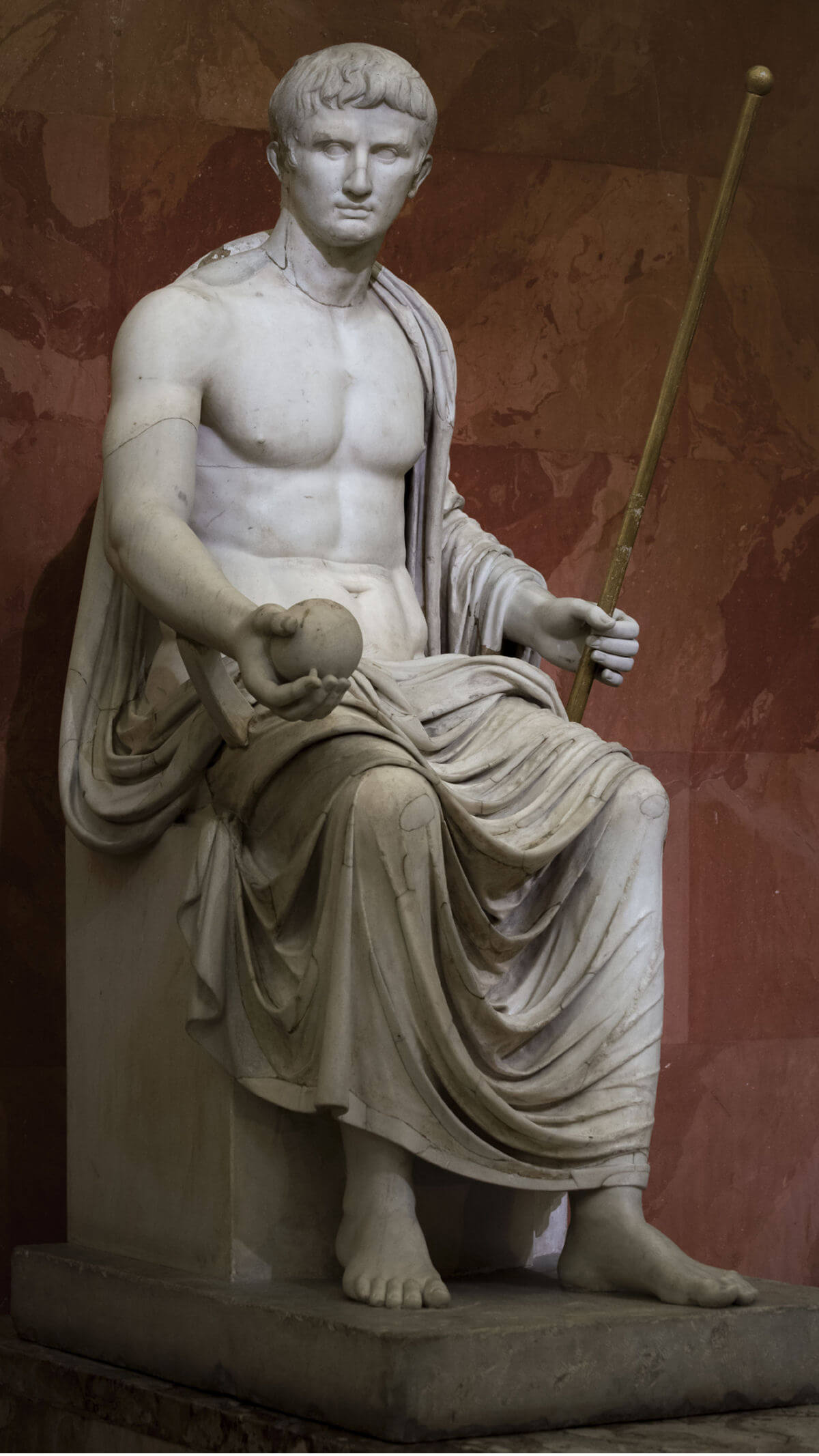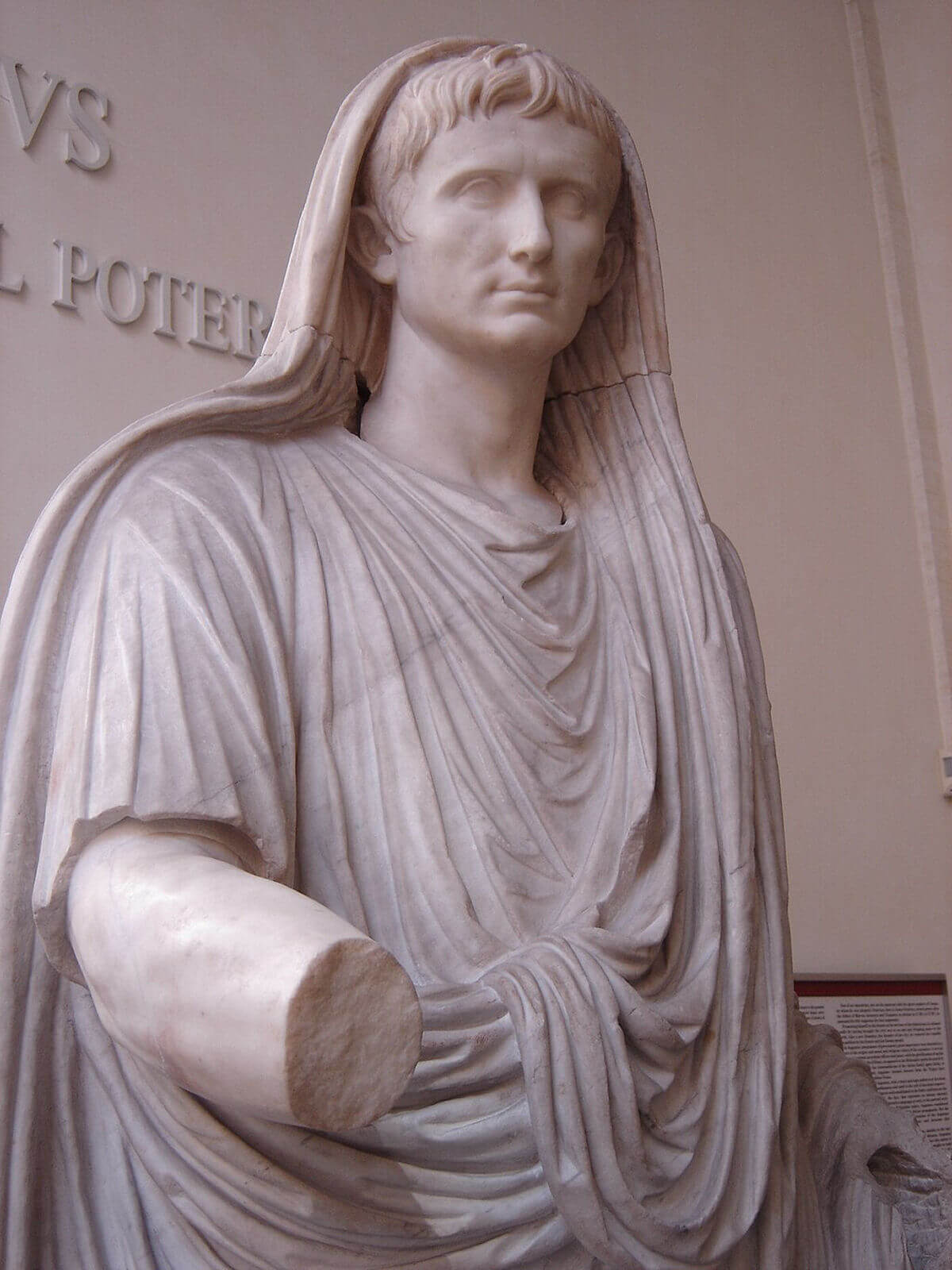Octavian Moves Slowly Towards Becoming an Emperor
With the final defeat of Mark Antony, and Octavian's emergence as sole political ruler of the Roman world, the Roman Republic still teetered on the edge of potential disaster.
Despite Octavian's victory, and initial attempts to appear as a great advocate for the return of Republican rule, the Republican system had failed irreparably. To reconstitute the administration of Rome's now vast empire was to re-invite a continuance of the social disorder and civil wars that had plagued it for the last century or more.
What would be required was a soft and eventual rise of a single man to lead the nation as a whole. Unlike his predecessor and adoptive father, Julius Caesar, Octavian slowly consolidated his position and accepted honors and power gradually, minimizing fear and resentment among the elite classes.
This, coupled with the fact that most outright resistance to rule through a select few or a single head of state had been eliminated through war and previous proscriptions, meant that the stage was clearly set for Octavian's final transformation.

С. И. Сосновский, CC BY-SA 4.0, via Wikimedia Commons
A statue of Emperor Augustus as Jupiter
Initially, in order to maintain a semblance of legal authority under the Republican constitution, Octavian continued to rule through the Consulship. From 31 until 23 BC (the eventual date of the final 'Augustan Settlement') Octavian served as Consul. This would prove to be an unsatisfactory solution, however, and steps needed to be taken to procure a more permanent and lasting authority.
Although the previous oath of loyalty given to Octavian by citizens in the west now extended throughout the empire, there was still considerable work to be done on a political basis. First, however, there were matters of more pressing importance to be addressed.
In his victory over Antony, he had inherited a great number of veterans which, including his own men, numbered nearly half a million. Not only was their happy settlement - thereby securing their loyalty - a priority, but a shakeup of the Roman military system was in order as well.
The New Emperor Makes Changes to the Army
After annexing Egypt and its vast wealth, the issue of both compensation for veterans and available lands for settlement were no longer the political battlefield they once were. After overwhelming victory celebrations in Rome, including triumphal parades rivaling those of Julius Caesar, as many as 300,000 veterans were removed from active service.
With the subjugation of the eastern provinces secured, and veterans settled in excess of those required, Octavian established a permanent military structure that would include 28 regular legions; loyal to the state and not to the individual commanders who had recruited them. Alhough this number would fluctuate based on need, throughout the imperial period it became a permanent part of the established legionary system.
Octavian Deliberately Stays Modest
Along with the military solution, and in the wake of eastern settlements and grand triumphs in Rome, Octavian was offered several honors and political powers in 29 BC. These he prudently refused, perhaps sensing that despite all his accomplishments, the Senate was not yet quite ready to accept a 'Caesarean' style monarchy-like solution.
The refusal of such honors helped prop up support for Octavian as a true supporter of the Republic and Roman tradition, while in reality, he was simply playing it safe for the time being.
The continual Consulship was a truly inefficient solution to the problem of rule, however, and Octavian's occupation of one seat on a permanent basis would reduce the chances for aspiring Senators to climb the political ladder.
While Romans cared about tradition, what likely fueled them even more were their dignitas, or societal position. Depriving these men of avenues for success, whether they be positions of true power or simply figurative ones, the longer the issue remained unsettled, Octavian risked alienation from the Senate, and perhaps one day suffering the same fate as Julius Caesar.
Octavian's Bluff Wins Him Support From All Sides
By 27 BC, the matter was brought to a head through a shrewd and brilliant political show, staged by Octavian himself. In January of that year, he assembled the Senate and shocked his audience (at least those not already in on the plan) by giving up all of his powers and expressing a desire to retire to private life.
In this, he tactfully secured support from both the populace (which he had maintained all along), but also from the elite, who now believed that Octavian truly respected Republican ideals.
The reaction of the Senate - undoubtedly inspired by carefully positioned allies - was one of complete rejection of Octavian's proposal. They demanded that he remain in power, as it was necessary to secure peace and prevent another slide into civil war that would surely follow.
On 13 January 27 BC, the first of two Constitutional Settlements took place, and control of the 'Republic' was split between Octavian and the Senate. Three days later on the 16th, Octavian, through a proposal by Lucius Munatius Plancus, was to be granted the title Augustus, or 'exalted one' (a title cleverly thought up by Octavian's camp, indicating religious and political overtones above everyone else, while avoiding any direct relation to words that might indicate kingship).
Gaius Julius Caesar Octavianus was now and forever more known as Imperator (loosely meaning 'Commander' but eventually coming to mean 'Emperor' in modern languages) Caesar Augustus. Other honors were granted, but most important were political and military settlements, granting Augustus control of the legions and provinces where they were stationed.
While the Senate still had the authority to govern those provinces without military significance, elect magistrates and administer various traditional powers, Augustus held sway without alienating potential rivals.
In Egypt, which was kept as the personal possession of Augustus (and passed down to his heirs), no Senator was even allowed to step foot there without direct 'Imperial' approval.
Augustus' Power and Authority Continues to Grow
Between this settlement and an additional one four years later in 23 BC, Augustus was granted the right to appoint new patricians (something sorely needed after all the civil wars and proscriptions), nominate Senators for magisterial positions (something sparingly used by Augustus, but dominated by later Roman emperors), and of course had complete control of the military.
In fact, not only did legionaries swear an oath of loyalty to Augustus, but legates were his to appoint with no Senatorial interference, and he held the personal right to any and all victories claimed. No longer were individual commanders allowed the right of a triumph without the agreement of the 'Emperor', as he alone was reserved that honor.
Additionally, Augustus established his own bodyguard along the traditional lines of those established for provincial governors. Abandoning the concept of lictors, which had previously been an indication of Republican authority, nine cohorts (nearly a full legion) of men were recruited and assigned to both Augustus' personal protection and the protection of peace throughout Italy. The Praetorian Guard, a concept which had been in existence since at least the 3rd century BC with regards to protecting Consuls, was now established as a permanent and elite body to protect the emperor.
While troops were not allowed a permanent presence in Italy or Rome (at least under times when the constitution was respected) prior to Augustus, he now maintained direct control of this intimidating presence.
In the Senatorial provinces as well, although he technically did not have authority, the word of Augustus was enough to inspire magistrates to abide by his wishes, clearly indicating his supreme authority over the entire Roman world.
The Roman Empire Has Been Born
The year 23 BC also saw the establishment of the title 'Princeps' or 'first citizen' or 'first among equals' (and eventually formed the root of the word Prince). This title, much like that of Augustus, was another way of granting him ultimate authority without calling him 'Rex' or 'King'.
This title was a hereditary right and, by its virtue, the early empire became referred to as the Principate (until the time of Diocletian who dropped the title in preference for 'Dominus').
Among many honors, titles and privileges granted, two important titles came later. With the death of Lepidus, the former triumvir, in 13 BC, Augustus was granted the title and position of Pontifex Maximus, making him head of the state religion. Like so many other honors, this became his and his successor's hereditary right, granting the emperor permanent control of the state religion.

The 'Via Labicana Augustus' sculpture of the Roman emperor Augustus as Pontifex Maximus.
Years later, in 2 BC, Augustus would be granted what was possibly the ultimate title (aside from his final deification) 'Pater Patriae' or 'Father of the Country'.
Although these 'settlements' which granted Augustus so much power technically allowed for a division of rule between the Emperor and the Senate, the Republic was officially dead, and the Empire, with all of its advantages and faults, had officially been born.



